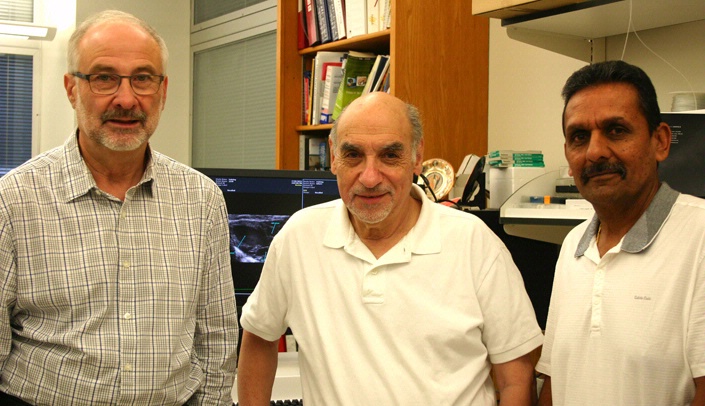Three cardiovascular researchers at UNMC have received a five-year renewal of a program project grant (PPG) worth more than $8 million to continue their research into chronic heart failure.
The renewal marks the fourth cycle of funding for the grant, which comes from the National Heart Lung and Blood Institute at the National Institutes of Health and runs through 2020. When completed, it will bring total funding from the PPG to more than $32 million since its inception in 1999. This is the longest continuously funded PPG at UNMC.
Innovation and leadership
“Dr. Zucker’s accomplishment cannot be overstated,” said Jennifer Larsen, M.D., vice chancellor for research. “His PPG was one of the first on this campus and remains the longest running. It not only takes a team to obtain and maintain a PPG, but a need to continue to innovate and lead the science. And through this, Dr. Zucker has remained an outstanding mentor to other investigators developing their PPG grants, as well.”
A PPG provides support for integrated research projects involving a number of independent investigators who share knowledge and common resources. Each project is directly related to common themes of the total research effort, in a well-defined integrated research program goal. Added value comes from common cores that are funded as part of the PPG.
The three investigators involved in this PPG – all in the UNMC Department of Cellular and Integrative Physiology – include: Irving Zucker, Ph.D., project director, professor and department chair; Kaushik Patel, Ph.D., professor; and Harold Schultz, Ph.D., professor.
The trio has been working together for the past 16 years to understand the pathophysiological processes that occur during the progression of chronic heart failure with the hope of finding better treatment strategies to improve complications and longevity.
The focus of their studies has been on the relationship between the nervous system and cardiovascular function in the heart failure state.
Heart disease is the leading cause of death for both men and women in the U.S. and is the leading cause of death worldwide. Heart disease claims more than 600,000 lives each year in the U.S. at a cost of more than $100 billion in health care and economic costs.
Nearly half the deaths from heart disease are due to coronary ischemia that progresses to chronic congestive heart failure, the most common diagnosis in hospitalized patients age 65 and older. About half of the people who do develop heart failure usually die within five years of diagnosis.
To date, knowledge emerging from this PPG, using animal models of heart failure, has provided key insights into the neural and molecular mechanisms responsible for impaired autonomic control of the heart and kidneys during the progression of heart failure.
Determining the mechanism/therapeutic efficacy of exercise training also has been one of the major goals of the grant.

Irv , et al, Mazel Tov!
Hal Maurer